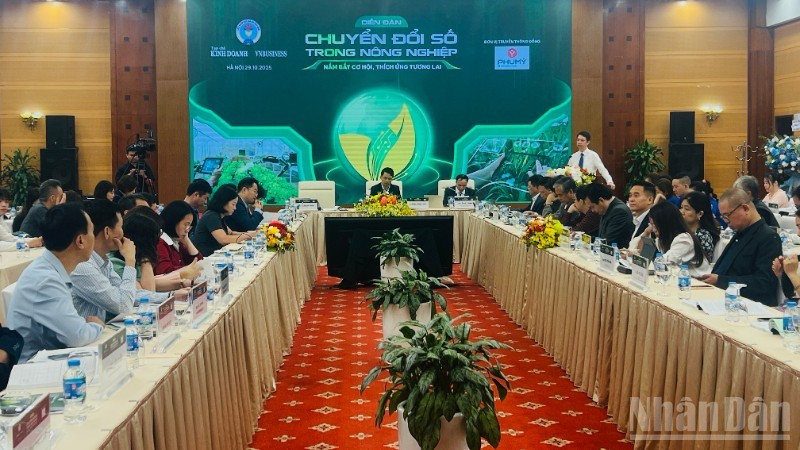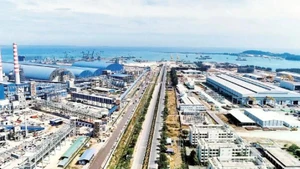In her opening speech, Cao Xuan Thu Van, Chairwoman of the Viet Nam Cooperative Alliance, emphasised that the biggest challenges facing agricultural cooperatives in implementing digital transformation fall into five main groups; finance, technological infrastructure, human resource shortages, development strategies, and policy access.
According to a survey conducted by the Viet Nam Cooperative Alliance, the level of digital transformation among cooperatives nationwide has reached only 32%. Of nearly 35,000 agricultural cooperatives, only 13.6% have completed digital transformation, 50% are in the process of implementation, and 36.4% have not yet started.
At the same time, the reluctance to change and reliance on traditional production methods remain major barriers that prevent many cooperatives from applying technology. “Through this forum, we hope that cooperatives, enterprises, and farmers will change their thinking and working methods, approach digital transformation boldly, invest in technology, and actively learn to adapt to the development trends of the global digital economy,” said Cao Xuan Thu Van.
According to the Department of Digital Transformation under the Ministry of Agriculture and Environment, Viet Nam currently has more than 19,000 agricultural cooperatives, accounting for nearly 70% of the total active cooperatives and attracting millions of farming households. Cooperatives play a key role in agricultural and rural development, helping stabilise employment and income for farmers.
Since 2018, the digital transformation process in the cooperative economic sector has achieved several positive outcomes. Around 2,000 agricultural cooperatives have applied digital technologies at different levels, from digitising accounting records and implementing traceability systems to selling products on e-commerce platforms.
Several exemplary models have shown that digital transformation is creating real value in agricultural cooperatives. Thanh Ha Cooperative (Hai Duong) has applied QR code traceability technology for its lychee products, enhancing information transparency, expanding markets, and increasing revenue by over 20%. Binh Minh Digital Agricultural Services Cooperative (Dong Thap) has implemented the AgriOne platform for electronic agricultural production management, allowing farmers to monitor crop cycles and receive technical guidance in accordance with VietGAP standards. Phu Loc Safe Vegetable Cooperative (Lam Dong) has adopted IoT sensors in smart greenhouses, reducing irrigation water use by 30%, labour costs by 20%, and improving product quality. These pioneering models demonstrate that digital transformation is not only technique but it is a comprehensive innovation process encompassing management, production, consumption, and data connectivity.
However, representatives from the Department of Digital Transformation under the Ministry of Agriculture and Environment acknowledged that the digitisation process in the cooperative sector still faces numerous challenges. Information-technology infrastructure remains weak in remote and mountainous areas, with unstable Internet coverage hindering the implementation of software systems and IoT devices.
Digital human resources are limited, as only around 15% of cooperative staff are proficient in using computers and software, and fewer than 10% have professional IT personnel. The lack of data and standardised interoperability between platforms restricts data sharing and exploitation. Most cooperatives also face financial limitations, being unable to invest in digital equipment, software, and infrastructure.
Moreover, awareness is uneven—many cooperatives still consider digital transformation as a a “supplementary” activity or procedural requirement instead of a long-term strategic goal. Without coordinated solutions, the “digital gap” between pioneering cooperatives and the rest of the agricultural sector is likely to widen, potentially hindering the progress of the national digital transformation.
To accelerate this process, the Government has issued a series of important policies and initiatives. Decision No. 749/QD-TTg in 2020 approved the National Digital Transformation Programme to 2025, with orientations toward 2030; Decision No. 1804/QD-TTg in 2021 approved the Programme for development support of the collective and cooperative economy for the 2021–2025 period, requiring the strong application of technology and digital transformation in management, production, and consumption. More recently, Decision No. 2913/QD-BNN-CDS in 2025, issued by the Ministry of Agriculture and Environment, announced the list of shared national databases, including data related to the collective economy and rural development.
According to the orientation by 2030, the agricultural sector targets 100% of cooperatives to have electronic records, 70% to use digital platforms in management, production, and consumption, and 80% of key products to carry electronic traceability codes.
To realise these goals, the Department of Digital Transformation has proposed five key solution groups: raising awareness and digital capacity among cooperative staff and members; developing unified digital infrastructure and platforms, ensuring stable 4G/5G coverage across all communes; standardising and interconnecting data, building a nationwide digital map of cooperatives to support management, planning, and trade promotion; improving mechanisms, policies, and preferential credit, and establishing a cooperative innovation fund to support technological investment; and promoting public–private partnerships and establishing regional digital cooperative innovation centres in key areas.
A representative from the Department of Digital Transformation emphasised that digital transformation in agriculture is not only a trend but a vital condition for cooperatives to adapt to climate change and international integration. Each cooperative must become a “digital cell” in Viet Nam’s smart agriculture.
Two in-depth discussion sessions held as part of the forum attracted the participation of many experts, managers, enterprises, and representatives of cooperatives from across the country. Participants agreed that digital transformation is the key to help Viet Nam’s agriculture make a breakthrough, turning agricultural cooperatives into nuclei of the rural digital economy where people, data, and technology converge to build a green, intelligent, and sustainable future for Viet Nam’s agriculture.
















